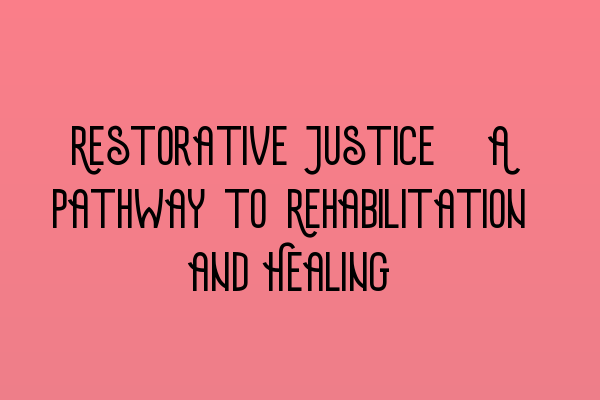Restorative Justice: A Pathway to Rehabilitation and Healing
Restorative justice is a powerful approach that focuses on healing the harm caused by criminal behavior, providing an alternative to traditional punitive measures. It aims to bring together victims, offenders, and the community in a process that encourages understanding, accountability, and ultimately, rehabilitation. In this blog post, we will explore the concept of restorative justice and its benefits for all parties involved.
The Principles of Restorative Justice
Restorative justice is grounded in several key principles that guide its implementation:
- Inclusion: Restorative justice involves all affected parties, including victims, offenders, and the community.
- Accountability: Offenders take responsibility for their actions and actively work towards making amends.
- Healing: The focus is on repairing the harm caused by the offense and promoting healing for all involved.
- Empowerment: All participants have the opportunity to express their thoughts and feelings, and contribute to finding solutions.
- Transformation: Restorative justice seeks to transform individuals and communities by promoting understanding and empathy.
The Restorative Justice Process
The restorative justice process typically involves the following steps:
- The preparation phase, where trained facilitators ensure that all parties are informed and prepared for what lies ahead.
- The encounter phase, where the victim and offender meet face-to-face, facilitated by a trained mediator. This allows for open communication and an opportunity for the victim to express the impact of the offense.
- The dialogue phase, where all parties engage in a facilitated dialogue aimed at understanding the harm and exploring ways to make amends.
- The agreement phase, where a mutually agreed-upon plan for reparation and rehabilitation is developed. This may include restitution, community service, or counseling.
- The follow-up phase, where the progress of the agreement is monitored, and further support is provided as necessary.
The Benefits of Restorative Justice
Restorative justice offers numerous benefits for all parties involved:
- Victims: Restorative justice gives victims a voice and a chance to be heard. It provides a platform for expressing their emotions, receiving apologies, and obtaining a deeper understanding of the offender’s motivations.
- Offenders: By taking responsibility for their actions and engaging in the process, offenders have an opportunity to make amends, gain insight into the consequences of their behavior, and find a path towards rehabilitation.
- Community: Restorative justice involves the community in the process, promoting a sense of shared responsibility and allowing for the reintegration of offenders back into society.
- Legal System: Restorative justice offers an alternative to the traditional punitive justice system, reducing recidivism rates and providing a more cost-effective approach to dealing with crime.
Conclusion
Restorative justice provides a pathway to rehabilitation and healing for all parties involved in a criminal offense. By focusing on understanding, accountability, and community engagement, it offers an effective and transformative alternative to punitive measures. To learn more about the SQE Criminal Law & Practice Law UK, SQE 1 and SQE 2 preparation courses, and the SRA SQE exam dates, visit the following links:
- SQE 1 Practice Exam Questions
- SQE 1 Practice Mocks FLK1 FLK2
- SQE 2 Preparation Courses
- SQE 1 Preparation Courses
- SRA SQE Exam Dates
Choose restorative justice for a more compassionate and restorative approach to criminal justice. It’s time to promote healing, rehabilitation, and transformation.
